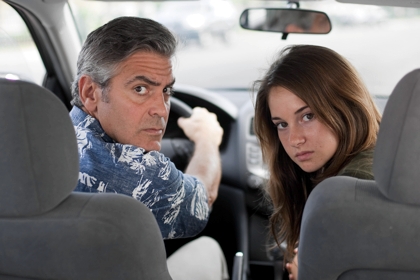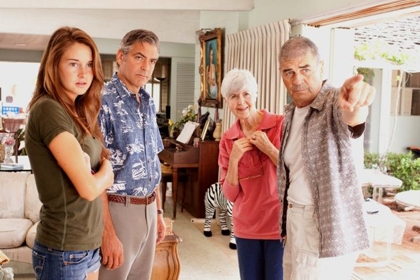Film of the month: The Descendants

Alexander Payne’s follow-up to About Schmidt and Sideways is a characteristic mix of funny and painful, with Hawaii lawyer George Clooney struggling with family baggage as his wife lies in a coma. By Philip Kemp
Ever since Matthew Broderick’s scheming high-school teacher in Election (1999), at once attracted to and repelled by Reese Witherspoon’s terrifyingly ambitious teenage politico, Alexander Payne has homed in on men in crisis – through Jack Nicholson’s grumpy pensioner in About Schmidt (2002) to Paul Giamatti’s depressive oenophile in Sideways (2004). They’re invariably deeply flawed characters, and if we end up sympathising with them, it’s only after we’ve been granted a good look at their more unlovable and often ludicrous aspects.
In Election Jim McAllister (Broderick) plots not only to defraud one of his pupils but to cheat on his wife; he ends up without wife, potential lover (they’ve ganged up on him) or job, and a face farcically swollen by a wasp sting. Likewise, newly retired Warren Schmidt (Nicholson) treats his wife with contempt (“Who is this old woman who lives in my house?”), only to be requited by having her drop dead on him, leaving him helplessly bereft and forced to realise – almost too late – that his whole life has been misdirected and misspent. Nearly the first thing we see Miles Raymond (Giamatti) do in Sideways is steal money from his mother; it might be cutely naughty in a teenager, but in a man in his forties it’s just sad and sleazy. And his travelling companion, washed-up actor Jack (Thomas Haden Church), is no less juvenile in his approach to women. This being a Payne film, both end up humiliated before achieving some small degree of hard-won wisdom.
Matt King (George Clooney) – the workaholic Hawaiian lawyer at the heart of Payne’s first feature in seven years, The Descendants – neatly fits the pattern. A self-confessed hands-off father (“I’m the back-up parent, the understudy”), Matt finds himself suddenly called on to engage with two daughters he scarcely knows while his wife Elizabeth lies unconscious in the hospital on life support, the victim of a waterskiing accident. And while he’s ineptly trying to fathom their differing emotional reactions to the situation, his elder daughter Alexandra (Shailene Woodley) lands him with a further whammy: his wife was having an affair and planned to divorce him.
Matt’s response triggers a classic instance of Payne’s knack for splicing pathos with comedy – or vice versa. Pausing only to grab the nearest pair of shoes (since we’re in Hawaii, he’s been wandering around the house barefoot), Matt dashes off to visit nearby friends who, he believes, will know the name of his wife’s lover. But the footwear he picks up are plastic deck shoes, totally unsuited for speed, and his genuine distress is undercut by the absurdity of his lumbering, duck-legged run. (It also typifies Clooney’s refreshing lack of personal vanity as an actor.) Even when he arrives at the house, desperate and sweaty, his urgent concerns have to wait while his friends finish off an acrimonious argument.
This characteristically Paynean mix of painful and funny holds good for at least the first half of the film. In one of the film’s edgiest scenes, Matt furiously harangues his wife as she lies on her hospital bed, accusing her of persistent hostility towards him: “The only thing I know for sure is that you’re a goddamn liar.” His guilt-ridden anger is heartfelt but at the same time farcical, vented as it is on a woman in a coma. Again, the confrontation with his short-fused father-in-law Scott (Robert Forster) crunches slapstick into grief in a messy emotional pile-up. Scott, his grey cropped head visibly rippling with aggression, accuses Matt of having pushed Elizabeth into danger-seeking pastimes through his emotional remoteness. The situation’s defused – or perhaps deflected – by the presence of Alexandra’s goofball sort-of boyfriend Sid (Nick Krause), who giggles at Elizabeth’s dementia-afflicted mother Alice. Re-routing his anger, Scott punches Sid in the eye. “How often do old people just haul off and cold-cock you like that?” inquires Sid in the car afterwards, sincerely bemused.

Sid’s only there because Alexandra, retrieved by Matt from her boarding school – where he finds her out of bounds at night, stoned – insists she’ll be “a lot more civil” if he’s around. It’s on the same rather thin pretext (since it’s hard to believe Alexandra, intelligent and emotionally aware for all her teenage waywardness, would tolerate the company of this idiot for more than five minutes) that Sid accompanies her, Matt and younger daughter Scottie on the excursion that takes up most of the film’s later stages. (As About Schmidt and Sideways indicate, Payne has a liking for variants of the road-movie genre.) Having identified his wife’s lover as a realtor called Brian Speer (Matthew Lillard), Matt tracks him to a holiday cottage on Kaua’i, the northernmost of the Hawaiian islands.
While there, Matt has a late-night encounter with Sid that reveals the lad as a sensitive soul – which feels less like a plausible deepening of character than a finger-wagging ‘don’t judge’ directed at the audience. But by this stage, in any case, the film has veered slightly off track. The stalking of Brian, involving much trudging up and down beaches and peering over hedges, goes on rather too long, and doesn’t come back into focus until Matt’s encounter with Brian’s wife Julie (Judy Greer), sweetly unaware of the situation, and then his confrontation with Brian himself. Brian, it turns out, far from reciprocating Elizabeth’s grand passion, regarded her as nothing more than a passing fling and had no intention of leaving his wife for her. Rather than have the cuckolded husband punch him out (the catharsis a less subtle filmmaker might have chosen) Payne has Matt, far more tellingly, treat Brian with pitying contempt.
Payne, whose early features were set in his native Omaha, has always shown an acute if unconventional sense of place. Traditionally, Hawaii’s been used in films either as a frangipani-swathed tourist mecca (Forgetting Sarah Marshall, Blue Hawaii) or as the backdrop to the attack on Pearl Harbor. The Descendants signals from the outset that it’s aiming beyond the clichés with Matt’s disenchanted voiceover: “My friends think that just because we live in Hawaii, we live in paradise. Like a permanent vacation – we’re all out here sipping Mai Tais, shaking our hips and catching waves. Are they insane? Do they think we’re immune to life? How can they possibly think our families are less screwed-up, our heartaches less painful? I haven’t been on a surfboard for 15 years. Paradise can go fuck itself.” Even so, Payne isn’t above splurging on the island’s natural beauty when showing us the acres of unspoiled land that Matt’s family have inherited and must now sell off; nor is he beyond exploiting the tackier elements of the local tourist trade to ironic effect. A grass-skirted hula-dancer doll, quivering on the dashboard of a hire car, gets it own close-up.
The Descendants – adapted from a novel by Hawaiian writer Kaui Hart Hemmings – is the first of Payne’s features where he hasn’t shared scripting duties with his regular writing partner Jim Taylor (who on this film takes the role of producer). His co-writers here are Nat Faxon and Jim Rash, best known as actors at the Groundlings Theatre, and it may be their relative inexperience in screenwriting that’s led to something of a weakening in the second half. Even so, the film plays to Payne’s strengths – not just the emotional complexity and the constantly shifting kaleidoscope of moods, but his skill at eliciting in-depth performances from his cast. Shailene Woodley’s Alexandra visibly gains maturity, morphing from resentful teenager to supportive figure in the face of her father’s bewilderment; Beau Bridges, as one of Matt’s countless cousins, is all avarice and affability; and Judy Greer turns her few brief scenes as Brian’s cheated-on wife into a moving portrayal of undeservedly broken trust. And the film ends on a note of tantalising ambiguity: is Matt’s decision not to sell the ancestral terrain purely motivated by an exalted sense of “belonging to the land” – or is he also recalling, with secret satisfaction, that it’ll deprive Brian of a massive fee?
Alexander Payne discusses the comedy of the middle-aged guy on page 59 of the February 2012 issue of Sight & Sound
See also
On the road to Telluride: Nick James makes a pilgrimage to the Telluride Film Festival (September 2011 )
The American reviewed by Michael Atkinson (December 2010)
Boys’ own stories: Henry K. Miller on the Indiewood / Fratpack generation (March 2008)
Good Night and Good Luck previewed by Geoffrey Macnab (November 2005)
Red, white and blue: Mark Salisbury on Sideways (February 2005)
About Schmidt reviewed by Xan Brooks (January 2003)
Election reviewed by Geoffrey Macnab (Octber 1999)



